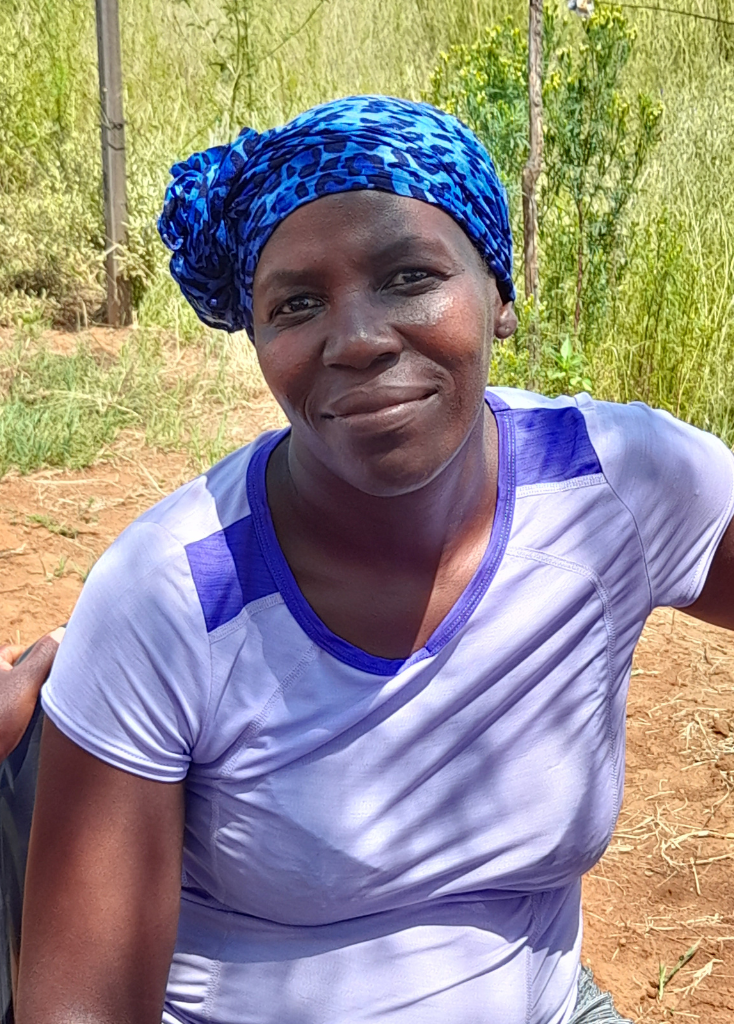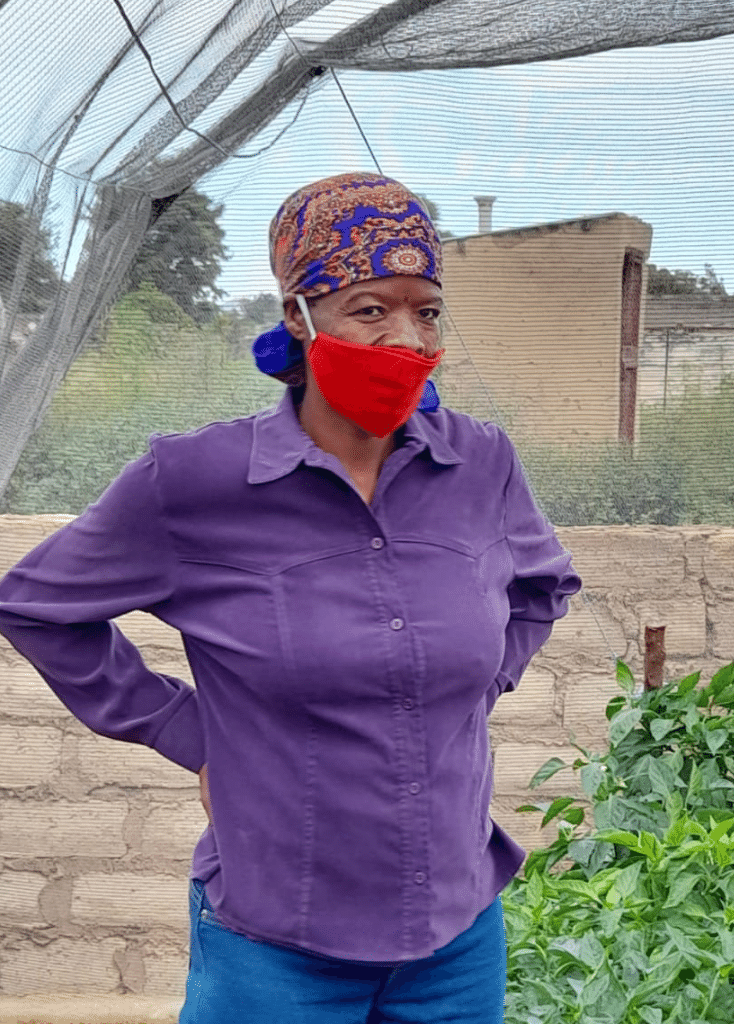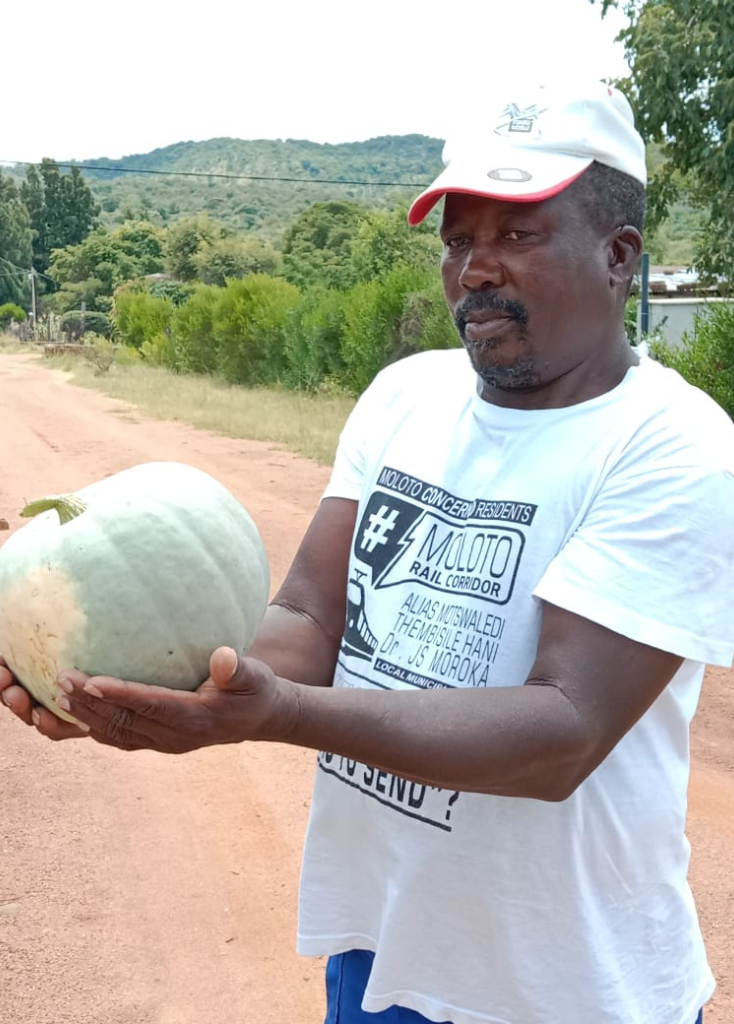
BBL PARTICIPANT: Julia Nzabe Matlala, Moutse, Limpopo
In a Nutshell
Through her participation in SocioTech’s Broad-Based Livelihoods (BBL) strategies to stimulate personal economic activity, Julia Nzabe Matlala has upgraded her horticultural and business management skills. She is teaching her grandchildren to appreciate the blessings of a food garden.
She says…
I think I was born a business hustler. It is just the way my mind works. I like to look at where I am and see opportunities. I am never not looking out for those opportunities. All day and every day. If you want to succeed, you have to check what is around you and make the most of it.
Even when I was a little girl I could see how business works. I used to go and collect wild thepe leaves and then I would sell those leaves and give the money to my parents. That was my first experience of making money.
These days I have a lot of different businesses; selling vegetables grown in my garden, grass collecting on the mountain for thatching, I crochet hats, I do beading on takkies (that I buy for R75 and sell for R350) and I even make my own moerkoffie. It all adds up.
I manage to do so much because I am an early riser. I am always up awake by 4am. Every day I get up before the dawn, I do all the cooking for that day and then I go to my garden. I do all the cooking then because during the day I am busy, busy, busy and I don’t want to have to stop to cook. By the time the rest of my family wakes up, I have already been working for several hours.
When my grandchildren are ready for school in the morning they always ask for money to take to the tuck shop and I say to them: “Come and join me in the garden.” When they get to the garden I say to them: “Do you realise that the money for your tuck shop treats comes from this garden?” And then I take out my Spar box full of all the R5 coins that I have made from selling these lovely vegetables and I give them each some money to take to school. That is our little ritual in the morning. Children learn by repetition. Every time we have this little tuck shop conversation they learn to appreciate the role that this garden plays in the life of our family.
"Customers buy them by the truckload..."
I make money from the garden and I save money because really the only food my family needs to buy is meat. Everything else we get from the garden. I am very aware of my good fortune. I know that I am blessed so I try and help others wherever I can. If there is a funeral I always try to donate vegetables. Spinach or beetroot or whatever the family need.
What I have in my garden changes with the seasons. I have just harvested a whole lot of crops so the garden is quite bare at the moment but right now I can still see the red, green, orange – like that food robot idea that they teach in the SocioTech MyFood classes. I still have some lovely tomatoes and pumpkins and peanuts and spinach and sweet potatoes and of course the guxe (bush okra). I am famous for my guxe. Sometimes you see a row of fancy cars all lined up at my gate all of them just waiting to buy that guxe. Rich people, poor people, they all love that guxe.
The other thing I am famous for is my moerkoffie. I am really sorry that I don’t have any to give you now. It is so popular that I have sold out. It is not quite the same as what Afrikaner people call moerkoffie. We make ours with a kind of climbing bean. I have them climbing all up the back fence of my garden. When I was a little girl, my mother used to grow it too and I didn’t see them for years but then one day I was in Obaro and there it was, so I bought some seeds and they have done so well. When it is ripe you roast those beans and then you grind them and then pour hot water over them. After a few minutes you can strain it and drink it. You need about 1 Tablespoon of the ground, roasted bean to make about 4 cups. It is absolutely delicious. It tastes a bit like FG coffee that you can buy in the shops but much, much nicer. Those beans are not yet ripe. They will be ready in about June. So, when they are ripe I will call you and we can make it together.
Like I said, a lot of my customers come to the house but I don’t just wait here for business to arrive. On pension day I set up a stall next to the pay point so that when people have drawn their money they can come and buy. I can’t sit around and do nothing so when I have finished with my garden duties I go and cut grass on the mountain. And I also employ others to cut for me too. People buy that grass for thatching. You can sell those bunches for at least R3.50 each and customers buy them by the truckload so that is good business.

I also like helping in my community. Whenever SocioTech do training sessions here I am always happy to help. I go door to door advising and supporting when people dig those trenches. I make sure that they are done properly. I think of it as part of my community duty. They call it Phinda-Phinda and it means that if you learnt new skills from SocioTech you need to pass them on. I know that my garden has been greatly improved by what I learnt so I am always happy to help so long as I can see that people are willing to work hard. I don’t tolerate laziness in myself or in other people. I believe that we should all sleep early and wake early. I like to start the day with a fresh mind and a fresh cup of coffee that way I am ready for anything and everything.
"They call it Phinda-Phinda and it means that if you learnt new skills from SocioTech you need to pass them on."










